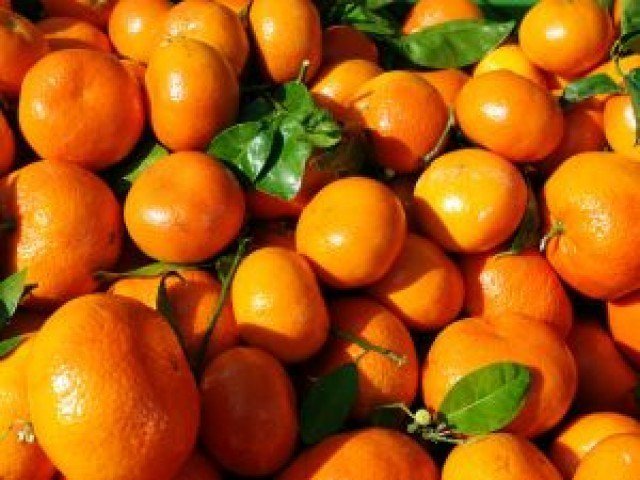Kinnow exports to decline by 35% YoY in 2021

By MG News | November 30, 2021 at 02:26 PM GMT+05:00
November 30, 2021(MLN): The export of kinnow is likely to be limited to 300,000 tons with an anticipated decrease of 35% compared to the previous year, Waheed Ahmed, the Patron-in-Chief, All Pakistan Fruit and Vegetable Exporters, Importers and Merchants Association (PFVA) said in a press statement today.
As per PFVA, the significant increase in the sea freight cost, ill-effects of climatic changes and the reduction in the production of kinnow has emerged as a barrier to export kinnow from Pakistan.
The exporters of kinnow are in a state of uncertainty during the current season of kinnow. As of now, large-scale preparation for export of kinnow has not yet started, although the season is due to commence shortly from 1st December 2021, he said.
A few kinnow factories in Sargodha are making preparations for the export. The export of kinnow faces stiff challenges due to the exorbitant increase in the cost of sea freight. Last year the export of kinnow was 450,000 tons against the export target of 350,000 tons. It is anticipated that the export of kinnow will remain around 300,000 tons during the current season, 35% less compared to last year, he noted.
He also stated that due to the crisis of high sea freight cost this year, the export of kinnow from Pakistan is likely to badly suffer to the international markets of Russia, Canada, Ukraine, Indonesia, and Philippines, since Pakistan exports 50% of the total; the export volume of kinnow to these countries.
The cost of sea freight to Russia, an important international market, during the previous season was $2500-3000 per container which has now been enhanced to $7000 per container. Similarly, the sea freight cost to the Philippines, Indonesia which was USD 2000 has now increased to $4000-5000. Simultaneously, with an exorbitant increase in the cost of sea freight, the shipping companies do not have any definite schedule.
Due to the perishable nature of fruits and short shelf-life, there is no guarantee that the fruit consignments would reach their destinations in time. Under the prevailing circumstances, the cost of export, as well as uncertain situations from shipping lines, the export of kinnow from Pakistan, is likely to be badly hit, he deplored.
He also explained that Pakistani kinnow used to be sold in the Russian market being cheap compared to kinnow from Morocco and Turkey. 10kg cartons of Pakistani kinnow used to be USD 5-6 less than 10kg cartons of kinnow from Morocco and Turkey. However, now due to sharp increase in the cost of sea freight, the price of Pakistani kinnow would almost be equivalent to the cost of kinnow from Turkey and Morocco making it very difficult to remain competitive in this market.
On other hand, the Turkish kinnow can be sent to the Russian market via land & sea routes as well which has further enhanced challenges for Pakistani kinnow in the Russian market.
He also said that under these circumstances, the land routes can be a better alternative to export Pakistani kinnow via Iran and Central Asian states. However, despite the TIR convention, under which Pakistan is availing the privilege to transport trade goods via land routes, the cost of transportation via land routes is the same as the cost of sea freight. He further highlighted that Iran is a promising international market for Pakistani kinnow, however, his important market had been closed for the last 10 years due to the non-issuance of import permits by the Iranian officials. Last year Iran issued import permits for a limited period and this year nothing has been done so far in this context.
With a sharp increase in the cost of sea freight and the cost of production of kinnow, there has also been a significant increase in the cost of packaging and transportation. Cost enhancement in petroleum products, upward revision every now and then in tariff of electricity and gas and increase in the cost of agriculture inputs, the cost of production of kinnow and cost of transportation have multiplied manifolds. The cost of packing material for kinnow has also increased by 40%.
Under these circumstances, the exporters of kinnow are in a state of uncertainty and consequently as of now when the kinnow season is just about to commence, only a few factories are operating in Sargodha while the majority are still inoperative, and thus, the kinnow industry of Rs. 125 billion is in a state of uncertainty. Meanwhile, the old orchards of kinnow are unable to resist the ill effects of climate change. Pakistan produces 2,400,000 tons of kinnow while during the current season the production is likely to be restricted to 1,700,000 tons, 30% less than the previous year, he disclosed.
Waheed Ahmed shared that the kinnow industry is a source of direct employment to 400,000 people. With a likely reduction in the export of kinnow, the exporters, growers, and people working in the orchards and transport companies would be equally affected. To get the kinnow industry out of the current crisis, it is imperative that the government should provide financial assistance on export of kinnow to minimize the losses to a greater extent.
He also stressed the need to negotiate with Iran to get the Iranian market opened for the export of 80,000 tons of Pakistani kinnow to this important international market which can assist in neutralizing the ill effect of other international markets. He also emphasized on the government of Punjab to focus on developing new varieties of Citrus as well.
To reduce the cost of production considerably for the grower, there is a definite need to provide financial assistance/grant to the farmer on fertilizers, pesticides, and other agriculture inputs, he further added.
Copyright Mettis Link News
Related News
| Name | Price/Vol | %Chg/NChg |
|---|---|---|
| KSE100 | 130,686.66 280.01M |
0.26% 342.63 |
| ALLSHR | 81,305.25 897.01M |
0.35% 281.26 |
| KSE30 | 39,945.45 114.02M |
0.09% 37.19 |
| KMI30 | 190,698.05 148.61M |
0.61% 1163.05 |
| KMIALLSHR | 55,074.15 495.43M |
0.53% 290.50 |
| BKTi | 34,568.40 28.73M |
-1.07% -372.33 |
| OGTi | 28,739.35 22.59M |
1.57% 443.29 |
| Symbol | Bid/Ask | High/Low |
|---|
| Name | Last | High/Low | Chg/%Chg |
|---|---|---|---|
| BITCOIN FUTURES | 110,240.00 | 110,525.00 110,155.00 |
-175.00 -0.16% |
| BRENT CRUDE | 68.85 | 69.14 68.32 |
-0.26 -0.38% |
| RICHARDS BAY COAL MONTHLY | 97.50 | 0.00 0.00 |
-0.75 -0.76% |
| ROTTERDAM COAL MONTHLY | 108.45 | 109.80 108.45 |
-0.55 -0.50% |
| USD RBD PALM OLEIN | 998.50 | 998.50 998.50 |
0.00 0.00% |
| CRUDE OIL - WTI | 67.14 | 67.18 67.00 |
0.14 0.21% |
| SUGAR #11 WORLD | 16.37 | 16.40 15.44 |
0.79 5.07% |
Chart of the Day
Latest News
Top 5 things to watch in this week
Pakistan Stock Movers
| Name | Last | Chg/%Chg |
|---|
| Name | Last | Chg/%Chg |
|---|




 Trade Balance
Trade Balance
 CPI
CPI